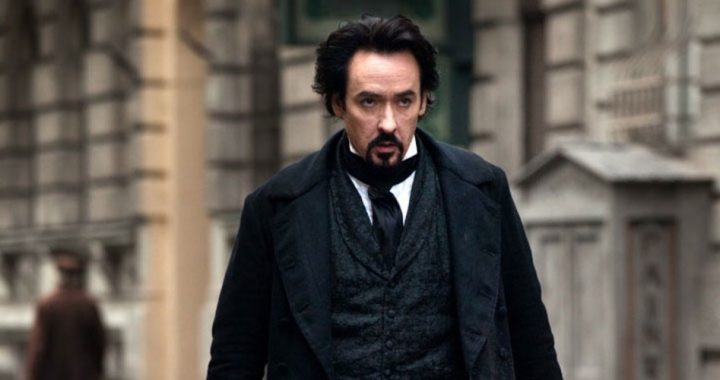
If you are as avid a reader of Edgar Allen Poe as I am, you too were likely thrilled when you learned that there was to be a film based on Poe’s highly imaginative and often grotesque stories. And The Raven does not disappoint. It is a tale of a copy-cat killer who commits murder by recreating some of the most horrific scenes in Poe’s stories.
The film does an excellent job of simultaneously capturing Poe’s biography and retelling some of Poe’s greatest tales, though moviegoers should be warned: You require a slight taste for gore to be able to sit through this film.
Edgar Allen Poe was a troubled writer. He had a taste for alcohol that he could scarcely quench on his meager salary. He struggled with finances throughout most of his life, and his gruff exterior proved rather difficult to overcome, resulting in broken relationships with his foster parents and even his own publishers.
Poe was a scathing critic of other writers, including the famous Henry Wadsworth Longfellow, which often resulted in some negative backlash for Poe, whose arrogance made it rather difficult for him to see the quality in another writer’s work.
Poe’s life was characterized by great loss. His father left him at a very young age, and his mother died when he was three. To make matters worse, the relationship between Poe and the people who adopted him later became estranged. Additionally, Poe loved and lost several women, producing a sense of loss within him from which he never seemingly recovered.
In addition to writing a number of infamous poems and short stories, Poe published a number of valuable essays on writing, wherein he asserted that the most poetic topic a story may feature is the death of a beautiful woman. In fact, Poe had an affinity for producing stories and poetry where death and lamentations were central to the plot.
The Raven effectively captures all of these elements of Poe’s personality and biography in the film. Of course, it does take some creative license to produce the plot of this story, but the filmmakers were fortunate, as they had some of the greatest American masterpieces ever written from which to borrow much of the film’s plot.
John Cusack plays Edgar Allen Poe, whose troubles are center stage at the start of the film. He struggles with alcoholism and finances, and manages to fall in love with Emily Hamilton (Alice Eve), the daughter of the affluent Captain Hamilton (Brendan Geeson), who is rather unhappy to learn of his daughter’s affections for the struggling writer.
But when the vicious murders of a mother and daughter bear a painfully similar resemblance to Poe’s tale “The Murders in the Rue Morgue,” Poe’s life takes an even more dramatic turn. Another murder takes place, this time with the marks of Poe’s brutal “Pit and the Pendulum,” dispelling any hope that the resemblances to Poe’s stories are merely coincidence.
Fields (Luke Evans), a chief investigator, is called in to solve the mystery of the violent murders. He cannot help but wonder whether Poe is the man behind the crimes. He eventually enlists the help of Edgar Allen Poe himself to put an end to the murderous rampage of a crazed madman who clearly has an obsession with Poe’s writing.
And just when it seems it cannot get any worse for Poe, the sadistic killer kidnaps Emily and plans to use her in his next copy-cat murder, this time attempting to re-enact “The Tell-Tale Heart,” imprisoning her beneath the floorboards, where she could succumb to death by suffocation.
Will Poe and Fields find the madman in time to save Poe’s beloved Emily? You will have to see for yourself. But for those of you who favor thrills, chills, and good old fashioned horror, the wait is worth your time.
John Cusack does a terrific job of capturing all the mystery of Poe. He is at once a man with a harsh exterior, unfettered arrogance, and a scathingly critical tongue, who manages to still have a heart that makes it rather difficult for him to understand why anyone would wish to reproduce the plots to his stories.
The film also seems to make the astute observation that Poe’s obsession with death and loss in his stories was provoked by his own sense of loss in his life, which has been the assertion of a number of literary critics as well.
In a number of scenes, The Raven effectively captures all of the sadism and gore that makes Poe’s stories bone-chilling. In fact, one might assume that Leigh Whannell, the writer of the film Saw, took a page out of Poe’s handbook, as both writers seem to have an affinity for the slow and painful death of their victims, which in some cases, was brought on by the victim’s own actions.
The Raven also seems to be making a statement on the sort of effect that entertainment can have on an individual, as the madman in this story confesses to Poe that it is Poe’s plots that inspired him. Of course, the madman had to have had a predisposition toward violence in the first place, as most copy-cat killers do, or else more viewers/readers would fall victim to such inspiration.
And even with the presence of violence and depravity that characterize this film, there are some positive elements, including sacrificial love and spirituality.
Overall, The Raven is an exciting film that will keep viewers on the edge of their seats. And for Poe’s biggest fans, the film does a good job of paying homage to both the man and the writer.




